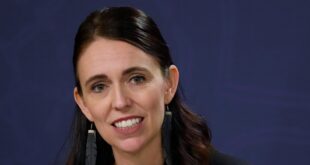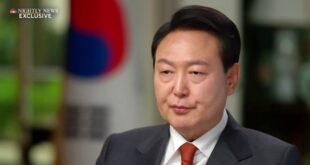[ad_1]
NBC News spoke with South Korean lawmakers, human rights organizations and dozens of LGBTQ South Koreans in three of the country’s largest cities: Seoul, Daegu and Busan. Most say a bill that would outlaw discrimination against all minority groups — including the LGBTQ community — is the critical first step toward legal equality.
In 2007, former President Roh Moo-hyun’s administration helped draft South Korea’s first comprehensive nondiscrimination bill, but conservative groups like the Congressional Missionary Coalition immediately objected to its inclusion of “sexual orientation.” One petition sent to the Ministry of Justice prophesied, without any evidence, that “homosexuals will try to seduce everyone” if the bill were to become law.
Lawmakers have since proposed eight comprehensive nondiscrimination bills, but the country’s conservative president and legislators, as well as its powerful Christian lobbies, all but doom such bills in the Assembly, even though a majority of the public (57%) support a nondiscrimination bill, according to a 2022 Gallup Korea Poll.
But Lesvos said they are undeterred by the political deadlock. Defying the odds, they said, is the secret behind their survival.
At age 14, after revealing they had a crush on a female classmate, Lesvos was outed to their mother by a school teacher, who showed up at their home to share the revelation.
“She was postured like I was guilty or had just committed a crime,” Lesvos said of their mother. “I was so afraid. I wondered if I should run away — and I was only 14.”
The years ahead were not any easier. In their 20s and 30s, Lesvos said, they nearly lost the will to live, each day a barrage of discrimination, isolation and abuse.
“I couldn’t go a moment without alcohol,” they said. “I wanted to die. I thought I was alone, and I seriously considered taking my own life.”
Things changed in 1996, when Lesvos, then 40 years old, stumbled upon a small, queer-friendly bar in Seoul.
“I finally met queer friends,” they said, “and I finally got to be immersed in queer culture.”
A few months later, Lesvos cobbled together their savings and bought Lesvos Bar, making Lesvos the single owner of South Korea’s first lesbian bar. In the spirit of self-reform, they dropped their given name and, henceforth, they were known to all simply as Lesvos, they said. The name, as well as the word “lesbian,” derives from the Greek island of Lesbos, home to the ancient poet Sappho.
Lesvos has since assumed a second title: activist. Affixed to their bar’s taupe-colored walls are pride flags, rally leaflets and a command bestowed upon all who enter: “Pass the nondiscrimination bill.”
“Do we not have the right to live as equals?” Lesvos asked, their voice reaching a measured crescendo. “I wish the word discrimination didn’t even exist. But it does. It’s everywhere.”
‘Like a smoking habit’
Rep. Jang Hye-yeong, who was elected in 2020 at the age of 33, is a woman of many trades. The documentary filmmaker turned progressive lawmaker calls herself an advocate for this country’s LGBTQ community. Jang’s firebrand style quickly shot her to global stardom: She is now the face of the push for the nondiscrimination bill, and last year, Time listed her among the 100 emerging leaders shaping the future.
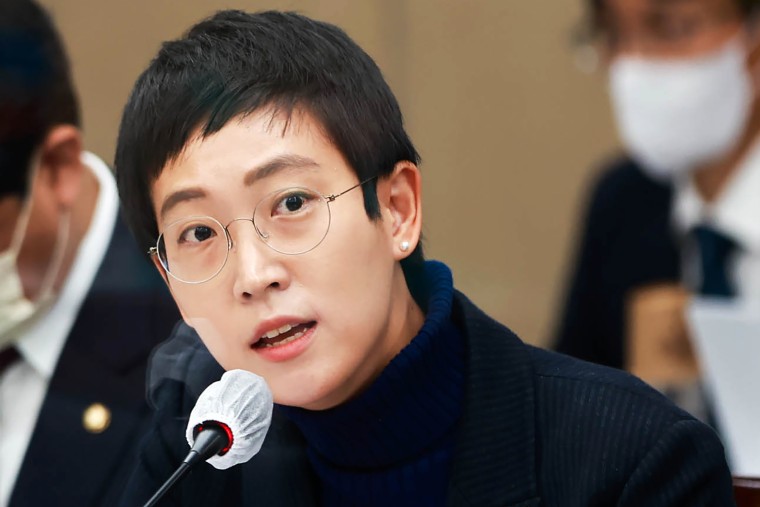
“Just telling somebody that you are LGBTQ will certainly subject you to discrimination,” the lawmaker, now 35, told NBC News. “A nondiscrimination bill means no citizen of this country is subject to state-condoned discrimination. A nondiscrimination bill means nobody is left behind, and now is the time to pass the nondiscrimination bill.”
South Korea, she said, has both a national and international imperative to pass a nondiscrimination bill, adding that the lack of such a law “means that South Korea — an important member of the U.N. and an advanced economy — is not protecting its citizens’ human rights.”
Victor Madrigal-Borloz, the U.N. Independent Expert on Sexual Orientation and Gender Identity, told NBC News that even if a country has no LGBTQ-specific anti-discrimination laws, “that doesn’t mean it’s not subject to its obligations under international human rights law,” including the right to freedom from discrimination and violence. This, he added, “includes South Korea.”
While support for a comprehensive nondiscrimination bill is strong in South Korea, Jang concedes that the odds of one passing, at least in the near future, are slim.
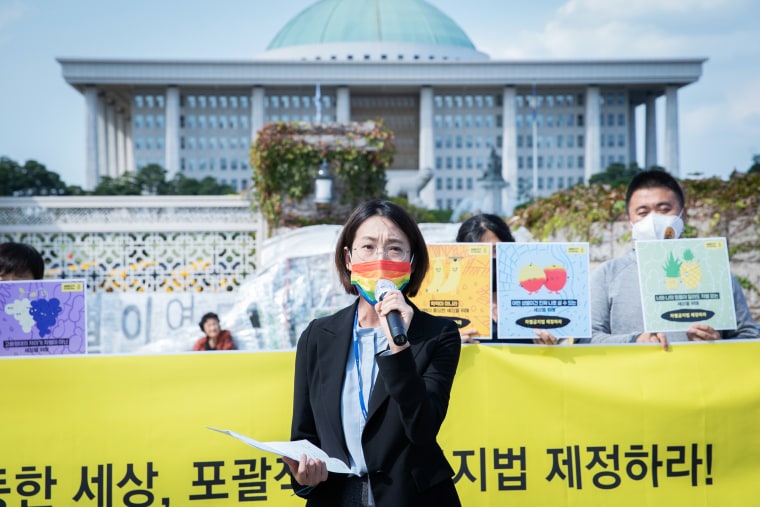
In the last election, Jang’s progressive Justice Party, which supports the bill, won only six seats in the 300-seat assembly. The country’s conservative president and People Power Party oppose a comprehensive nondiscrimination bill, while the left-leaning Democratic Party has expressed lukewarm support. But Jang blames the logjam on the country’s powerful Christian interest groups, which she said lobby against the bill and “LGBTQ people’s right to exist.” Lawmakers often avoid challenging Christian political stances to placate their base, she said.
The office of President Yoon Suk Yeol, along with leaders of the conservative and centrist parties, declined NBC News’ requests for comment.
Explaining his stance on same-sex marriage, then-candidate Yoon told Human Rights Watch that “although one may have the right to choose their sexual orientation,” South Korea needs “a careful approach to the issue because denying biologically assigned genders and recognizing same-sex couples could have significant social impact.” In May, a top adviser to President Yoon said “homosexuality can be treated,” like a smoking habit (he later resigned).
Protestant Pastor Yonah Lee, a staunch supporter of Yoon’s policies, is often called this country’s de facto “ex-gay” spokesperson. He has held events at the country’s legislature, and the former general secretary of the Christian Council of Korea called his work a “milestone to Korean history and society.”
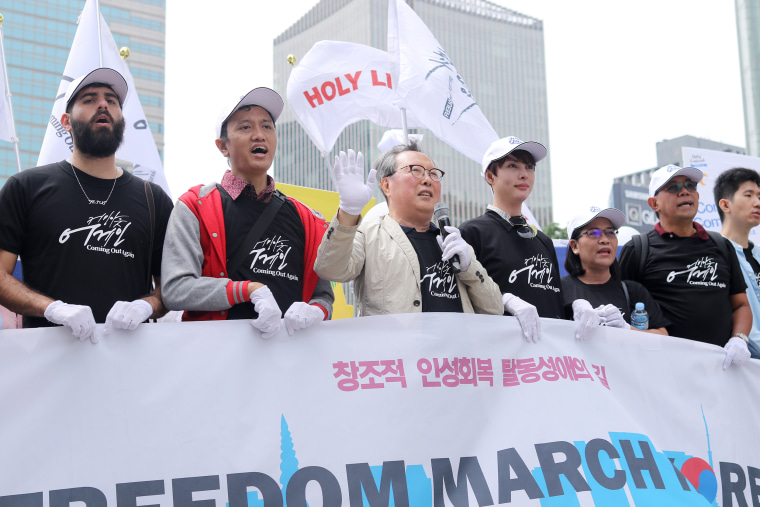
Pastor Lee acknowledged that discrimination against LGBTQ individuals is “wrong,” but he argued that the Bible “condemns homosexuality” and baselessly claimed that an anti-discrimination law that explicitly protects LGBTQ people would “force churches to close.”
Madrigal-Borloz, the U.N. expert, said the purported contradiction between religion and human rights is nonexistent.
“One does not speak the language of theology or dogma when addressing the human rights of persons,” he said, adding that South Korea is a constitutionally secular republic, and “there are limitations to the way in which one can expect their religious beliefs to limit the rights of others.”
Asked how his stance squares with South Korea’s obligations under international law, Pastor Lee cited a series of biblical scriptures, then demurred.
“LGBTQ adults can live their lives freely in Korea,” he said. “So why do we need the bill?”
‘We’re feeling furious’
To YoonDuck Kim, the presumption that LGBTQ people can live freely in the country is laughable. “The pastor is wrong,” he said. “He’s so wrong.”
Kim is a bisexual student at Seoul’s Yonsei University and was the president of its queer student union last year. The club, Come Together, publishes a magazine at the end of each school year, which is typically filled with essays from LGBTQ Koreans on and off campus.
 Latest Breaking News Online News Portal
Latest Breaking News Online News Portal

